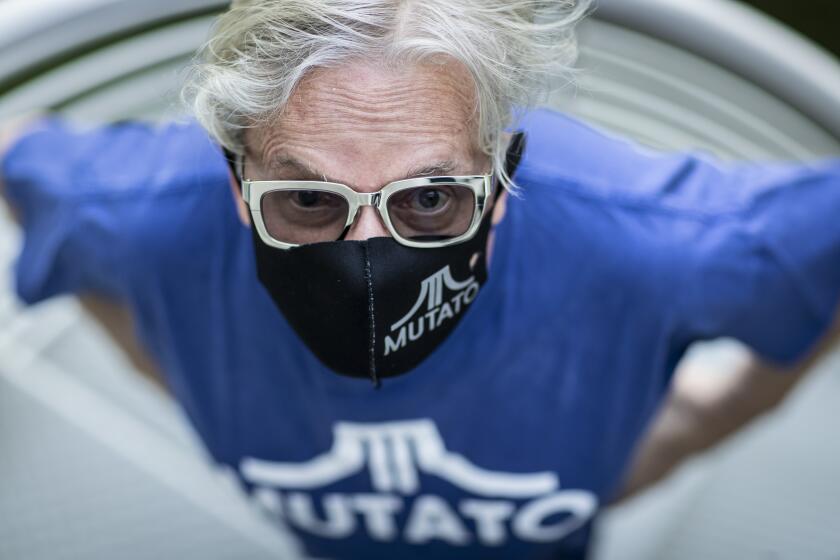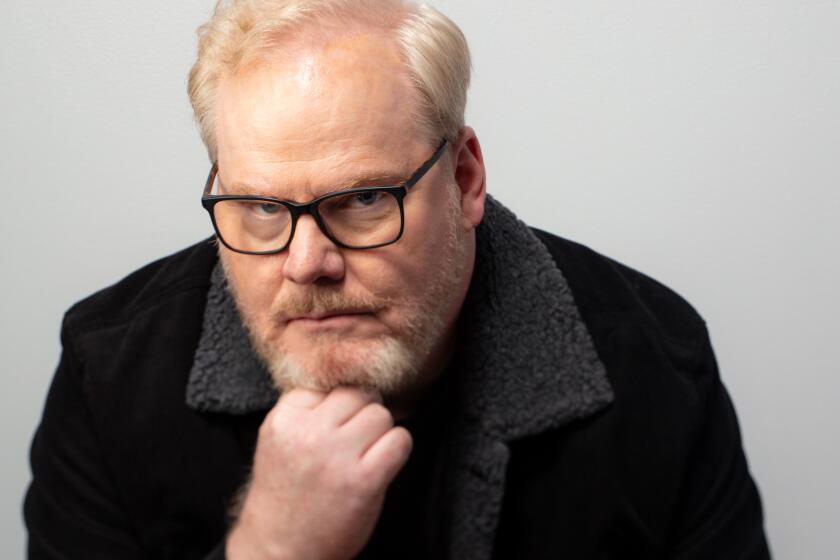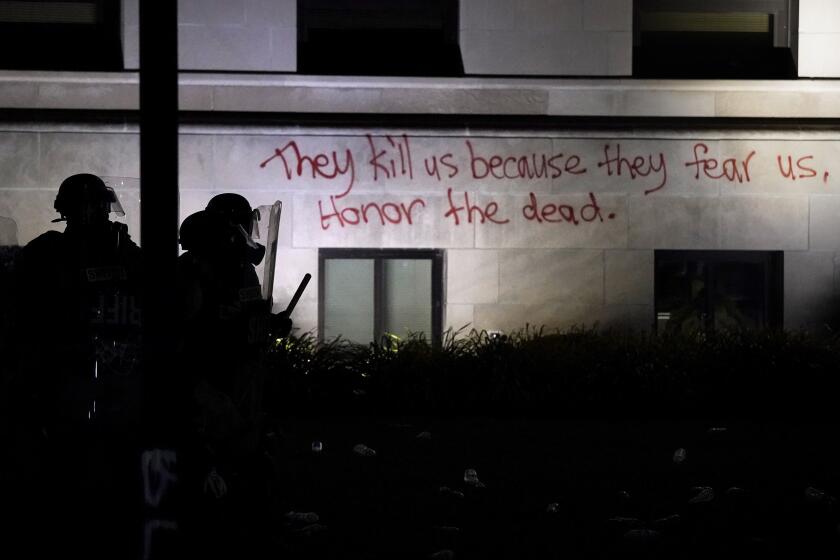Column: I thought the apocalypse would involve fewer Zoom meetings and more lava. Lessons of 2020
- Share via
I recently found myself Googling the Four Horsemen of the Apocalypse, because, you know, it just seemed like the responsible thing to do.
As a fan of fantasy, sci-fi, horror and the New Testament, I am reasonably familiar with the Book of Revelation — I watched the entire run of “Sleepy Hollow,” and I think I would remember if, say, “remote learning” was one of the horsemen — and while I’ve never been a big fan of John’s prophesy (so much violence, so little character development), these are strange days, and it never hurts to check in. (For the record, the letter to the seven churches of Asia makes no mention of online education whatsoever.)
I think it was an image of the lightning storm setting off the deadly fires in Northern California that sent me to the way back of the Holy Bible. (It’s not that I don’t trust Wikipedia or Christianity.com, but when you’re researching the end of the world, primary sources are best.) I quickly discovered that while fire is frequently discussed in Revelation, it is not one of the horsemen who appear when the first of seven seals — enclosing a mysterious scroll no one is worthy to open save the Lamb of God — is broken and the deadly, colorful and complicated series of events preceding the creation of the New Jerusalem commence.
Nor is, I was relieved to discover, plague — at least not technically. The horses are given definite and potentially symbolic colors, but the men who ride them are described in maddeningly vague terms. First comes a guy with a crown and a sword sitting on a white horse; he rides out as a conqueror to conquer [sic], which I guess sounds bad — though frankly, he reads more like Aragorn in “Lord of the Rings” than Damien in “The Final Conflict.”
The second horseman has more instant brand clarity — fiery red steed, check; the power to take peace from the earth and make men slay one another, check, check; definitely War, definitely bad.
Then comes the third, who, weirdly, holds a pair of scales and is heralded by four voices saying, “A quart of wheat for a day’s wages, and three quarts of barley for a day’s wages, and do not damage the oil and the wine.” This has been interpreted as Famine, but doesn’t it sound like some super-finicky rich guy talking to his caterers? “Do not damage the oil and the wine”? I’m sorry, what? Is the third horseman of the apocalypse Gordon Ramsay?
Devo cofounder Mark Mothersbaugh spent weeks in Cedars-Sinai hospital, hooked up to a ventilator, his mind wracked by violent hallucinations.
Then Death shows up fourth on his pale horse followed by — just to be clear where this whole thing is heading — Hades, and they are “given power over a fourth of the earth to kill by sword, famine, and plague, and by the wild beasts of the earth.”
So while not one of the quartet of horsemen, plague is still a name-checked participant in the Apocalypse, as are wild beasts, which I guess could include murder hornets, the unofficial wildlife mascots of 2020.
Also worth noting in the prophesy is that “fourth of the earth” statistic — while the United States holds only 5% of the world’s population, we do have 25% of the world’s coronavirus cases; adjust your origin-of-world’s-end bets accordingly.
I’m not trying to make light of how truly awful this year has been for so many, nor to downplay the legion of crises, tragedies, crimes and conflicts that have erupted. I am not making fun of the Bible or anyone’s interpretations of same. I grew up in a small town with people who believed in the Rapture and at least one of my friends had a fully stocked basement in preparation, which surprised me only because hers was such a lovely family that I assumed they would be plucked to heaven immediately. I may not be a true believer (if it should come to pass, I will definitely be enduring all seven years of the Tribulation), but my reacquaintance with Revelation was sincere.
I mean, at this point, why take chances?
There have been more than a few days of late when I’ve wondered if the apocalypse was nigh. I always assumed that it would involve far fewer Zoom meetings and a lot more lava (what a relief to learn the smiley face in Kilauea’s lava making the social media rounds is actually from 2016).
But there is truth in the term “banality of evil,” so there is always the chance that things will end while we’re all staring at our screens, thinking we should really stop supporting the plague-profiteering Amazon (except it’s so damn convenient!) or quit posting our righteous outrage on some social media platform that is interested only in harvesting our personal information for marketing purposes.
TikTok stars Bryce Hall and Blake Gray are charged with misdemeanors for allegedly holding large parties in the Hollywood Hills during the pandemic.
This could be how the world ends — not with a bang but on Twitter.
That’s where I first saw both the news of Chadwick Boseman’s death and the president’s praise of white men who fired paintballs and chemical irritants at Black Lives Matter protesters in Portland, Ore., mere days after another white man shot bullets into a protest in Kenosha, Wis., killing two people. (A man affiliated with a right-wing group was also killed in Portland.)
Taken together, the death of the man who played real life racial-justice warriors Jackie Robinson and Thurgood Marshall and the fictional king of Wakanda as our president lauded those attacking crowds demanding racial justice, felt like yet another portent of doom. My fleeting reassurance about the actual nature of the four horsemen was shattered, and for the next few days, I found myself, like Salinger’s Franny Glass midnervous breakdown, in near-constant muttering prayer.
For Boseman’s family and friends, for Portland and Kenosha, for Jason Blake and and his family, for the almost 200,000 Americans who have died from COVID-19 and for the millions they left behind. And for the rest of us too, caught in a fire tornado of grief and fear and fury.
Every day seems to bring some dreadful bit of grim news — more police shootings, more protests laced with violence, more incendiary presidential tweets, more schools walking back their reopening after virus surges. Facebook continuing to aid antidemocratic propaganda and conspiracy theorists. Bella Thorne ruining OnlyFans.
I can’t even speak about the Republican National Convention, in which our president told many blatant lies that it broke even mild-mannered “these aren’t skinny jeans, I’m just fat” comedian Jim Gaffigan, who spent the convention’s final night in the throes of a “wake up, Trump is a con man” Twitter rant. Which he followed up (after declining to speak to reporters, including me) with a Facebook post about how he just couldn’t remain silent any longer.
Jim Gaffigan — father of five, devout Catholic and purveyor of good old American jokes about how cold it is in Canada and how late people eat in Barcelona — in full political meltdown. If that doesn’t rate a horse in the apocalypse, Revelation is a dirty rip. Look at his website. The art for his new show “Jim Gaffigan: The Pale Tourist” depicts him as a centaur. Holding the world in his hands. That’s got to have broken some seal somewhere.
“I think Trump is ruining and possibly has already ruined my country,” comedian Jim Gaffigan says, expanding on why he spoke out after last week’s RNC.
Meanwhile, here we all are, stuck under a Stephen King-like dome of pandemic-curtailed version of life, all of us increasingly anxious and angry, which sometimes sends us to the streets to protest — for racial justice, workers’ rights or just the preservation of the freaking post office — and sometimes paralyzes us with exhaustion and dread.
Anxiety, anger, exhaustion and dread may not be the Four Horsemen of the Apocalypse, but they are certainly riders on the storm that is the United States in 2020. And while it would be nice to think that somewhere David Tennant and Michael Sheen, the bickering demon and angel who prevented the apocalypse in “Good Omens,” are out there working to keep the final days at bay, this seems like one of those stories that depend on human perseverance and growth rather than supernatural intervention.
It’s not the end of the world; it’s just a year in which many big problems came home to roost.
Problems that we must solve, quickly, before more people die and the guy with the scales starts whining about chair placement and lowering a day’s wages to a pint of wheat or two quarts of barley.
After all, the word “apocalypse,” from the ancient Greek term meaning “uncovering” or “unveiling,” originally meant the disclosure of great knowledge. Taken that way, we are indeed living in apocalyptic times. The stories we tell about solving big problems, be they murder mysteries or tales of great innovation, usually include a pivotal “hang on, we’ve been looking at this the wrong way” scene.
The obstacles we face in 2020 are not new ones — not even COVID-19, although it is certainly a highly virulent version of an age-old threat. But the particulars of this pandemic have forced us to look at our problems, and ourselves, in a new way.
We can’t control lightning, but we can address environmental issues, including climate change, that contribute to California’s increasing wildfires. We can tackle the staffing issues that have spread our firefighters so thin.
We don’t have a vaccine for COVID-19 yet, but we certainly should have been better prepared for the pandemic that scientists have been warning for years was inevitable, and we can still decrease transmission and fatalities by making, as a nation, a few simple changes like wearing masks and funding increased testing.
We can’t change the bitterness the lies in some people’s hearts, but we can and must fight systemic and institutional racism, including in the stories we tell (I still haven’t forgiven the above-mentioned “Sleepy Hollow” for sidelining and then killing its black female lead, played by Nicole Beharie).
COVID-19 is a viral blip on the radar when it comes to systemic racism in America, which ignores warning signs, like Jacob Blake’s death, and denies it exists.
Unfortunately, none of this is anywhere near as cool as finding some secret text or hidden talisman that will turn back the forces of darkness, or killing the Headless Horseman, or guarding the gates of hell beneath Sunnydale High. Compared with a quest to destroy the One Ring, wearing masks and staying out of crowds, limiting or redirecting funds to ensure better oversight of police departments, passing legislation that allows inmates who have completed firefighting training to become firefighters after they’ve been released, raising the minimum wage and making college more affordable — it all seems slow, difficult and tedious. Contact our elected officials? Yawn. Can’t we just arm ourselves with dragonglass?
Alas, no, we cannot turn back the horsemen of anxiety, anger, exhaustion and fear, or even the coronavirus, by having attractive and differently gifted young people read a spell, kill the Night King or destroy that final Horcrux.
The solution to the banality of evil is, for better or worse, the banality of good. A low-grade, consistent and often quite irritating insistence that we, and all the institutions we create, treat every individual equitably, in all things.
Boring, right? Kindergarten stuff, and why should we do it when all those [fill in the blank] aren’t doing it? What are we, saps?
No. We are warriors, battling the most dangerous horseman, the one who would take peace from the Earth and cause men to slay one another — with sword, with famine, with plague and with the wild beasts of the earth including, at times, ourselves. That guy we can stop.
And we’d best do it right quick, because if you think the toilet paper shortages were bad during the early days of the pandemic, you do not want to see what happens during those years of Tribulation.
More to Read
The biggest entertainment stories
Get our big stories about Hollywood, film, television, music, arts, culture and more right in your inbox as soon as they publish.
You may occasionally receive promotional content from the Los Angeles Times.














